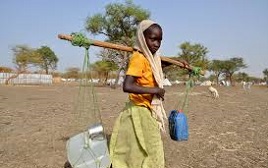By Yeneneh Sisay – The water ministers of Intergovernmental Agency for Development (IGAD) member countries discussed the widespread use of groundwater for irrigation as a solution to combat the negative effects of climate change.
Meeting this week in Ethiopia’s Somali region, the water ministers of Djibouti, Kenya, Ethiopia and South Sudan, the ministers stressed that there is a need for cooperation to expand groundwater to prevent drought and famine, as there is no agricultural land to be cultivated when the rains are absent.
Dr. Zebene Laki, Chief Executive Officer of Border and Transboundary Rivers at the Ethiopian Ministry of Water and Energy and African Groundwater Project Coordinator, told reporters that expanding groundwater is an alternative way to prevent conflicts in addition to its economic benefits for IGAD countries.
As the economy of the IGAD member countries is dependent on seasonal rainfed agriculture and due to the current international weather influence, the drought that used to be observed every two or three years has recently become an annual event, which is testing and making the economy of the entire African countries difficult.
Dr. Zebene explained that African countries will lose 50 billion dollars every year due to the effects of climate change, referring to the data released by the World Meteorological Organization in 2023. In the same year, a World Health Organization report released that more than 250,000 Africans may die due to lack of food.
According to the report issued by the World Food and Agriculture Organization (FAO) in 2003, agriculture has a direct relationship with more than 60% of the lives of Africans because agriculture is carried out through seasonal rains. These people are mainly affected by the effects of the weather and the emergence of insect pests from time to time.
FAO argues that the agricultural work of African countries is falling into trouble. In East Africa in 2022 and 2023, following the global climate change, Ethiopia lost more than 3.5 million quintals of annual agricultural production due to seasonal rains and cross-border invasion of locusts.
Agriculture is an essential driver of economic growth in the Ethiopian economy. Crop and livestock production account for roughly 65% and 25% of agricultural GDP. Improved inputs, enhanced management techniques, and expansion of irrigation farming is believed to help boost agricultural output.
However, significant constraints, such as limited access to finance and technology, slow potential gains. Further, inefficient market systems and underdeveloped research and extension services provide additional challenges including global climate change.
It can be assumed that when one converts the 3.5 million quintals of agricultural production lost by Ethiopia into the value chain, it has put the country in a huge loss of millions of dollars and has been causing great economic damages.
In order to prevent the lack of rain in the Horn of Africa every season and the economic and social problems that follow it, the countries can allocate a large budget and cooperate to expand the groundwater and use it for agricultural irrigation. Dr. Zebene also stated that the agricultural organization and other partner institutions have agreed to support the groundwater usage plans of the water ministers financially as well as technically and intellectually.

